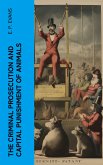In "The Criminal Prosecution and Capital Punishment of Animals," E. P. Evans presents a provocative exploration of the historical and legal frameworks surrounding the prosecution of non-human animals in various societies, particularly during the medieval period. This remarkable scholarly work employs a meticulous blend of legal history, anthropological analysis, and narrative vignettes to illustrate how animals, from mice to elephants, were once subjected to formal trials and, in some instances, execution. Evans' distinctive literary style combines rigorous scholarship with an engaging narrative, allowing readers to contemplate the moral implications of humanity's treatment of animals within the wider context of jurisprudence. E. P. Evans, a noted legal historian and writer, was profoundly interested in the intersections of law, ethics, and society. His academic background and belief in the evolving nature of justice compelled him to confront the often-overlooked practice of animal trials. Drawing upon a wealth of historical documents, Evans' work not only sheds light on past atrocities but also invites readers to reflect on contemporary views regarding animal rights and the ethical considerations of legal systems. This book is highly recommended for scholars, legal practitioners, and animal rights activists alike. Evans challenges conventional perceptions of justice, urging readers to reconsider the implications of law's reach beyond human subjects. For anyone interested in the intersection of law, history, and ethics, "The Criminal Prosecution and Capital Punishment of Animals" is an enlightening exploration that resonates with ongoing debates about morality and justice in our modern world.
Dieser Download kann aus rechtlichen Gründen nur mit Rechnungsadresse in A, B, BG, CY, CZ, D, DK, EW, E, FIN, F, GR, H, IRL, I, LT, L, LR, M, NL, PL, P, R, S, SLO, SK ausgeliefert werden.









